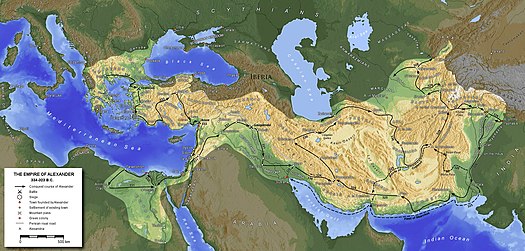User:Fuzzycatty/sandbox
Hellenism in the time of Jesus[edit]

The Greek obsession and pursuit of logic and reasoning were the engine rooms of breakthroughs across disciplines in human history. Through reasoning, significant advances were made in architecture, the arts, astronomy, democracy, fashion, engineering, mathematics, metaphysics, medicine, physics, politics, poetry and sports. The Greco-Roman world as the name suggests, continued to build on the vast foundation of Hellenistic achievements and culture. In a sense, being Hellenistic meant that one adopted the "Greek way of life" - by applying rigorous logic to the question at hand and contribute to the body of knowledge to attain wisdom. Simply put, the thirst for knowledge and understanding, beauty and a sense of fairness are the hallmark of Hellenistic influences even up to this day. Syncretism was an important factor in aggregating the wealth of knowledge and its wide acceptance by the indigenous people...

Outcomes[edit]
One of the most dominant outcomes of hellenization was the inauguration of koine ("common") Greek as the lingua franca of the eastern Mediterranean. The Septuagint (abbreviated LXX) translation meant that both the Jews and the Gentiles would be able to understand God's Word in Greek. The people in Jesus' world were mostly trilingual in that they spoke their local languages such as Aramaic, read and wrote Greek and understood Latin. Jesus, in his giving of new knowledge, advice and warnings across all levels of society from the esteemed Pharisees to the lowly "sinners", and in performing miracles, inspired and amazed them greatly. The locals could not have enough of Jesus and followed him on foot from town to town, gathering more people on the way (Matt 4:23-25, 7:28-29).
Hellenism in the Gospels[edit]
In Luke 14:25-35 Jesus taught that we must consider the cost of being a true disciple and put Him above all. It is apparent that Jesus wanted each person to actively and soberly consider the cost of following Him. The main concept to grasp is that the new life that God imparts through Jesus' resurrection will inevitably result in a new way of life in holiness, where faith, obedience and trust increase as one's relationship with God deepens. In this, we see how incompatible syncretism and the Hellenistic desire to continuously fill one's mind, time and resources with the next big discovery and revel in the "victories" of humankind, displacing God with the self, are. In Christianity, every believer is to subject him/herself under the authority of God and therefore, the reliance and pride of oneself and love for any material thing above God are not acceptable to Him. To lead such a life necessary meant that one must understand God's precepts and apply them to one's life with the sole aim of pleasing Him.

